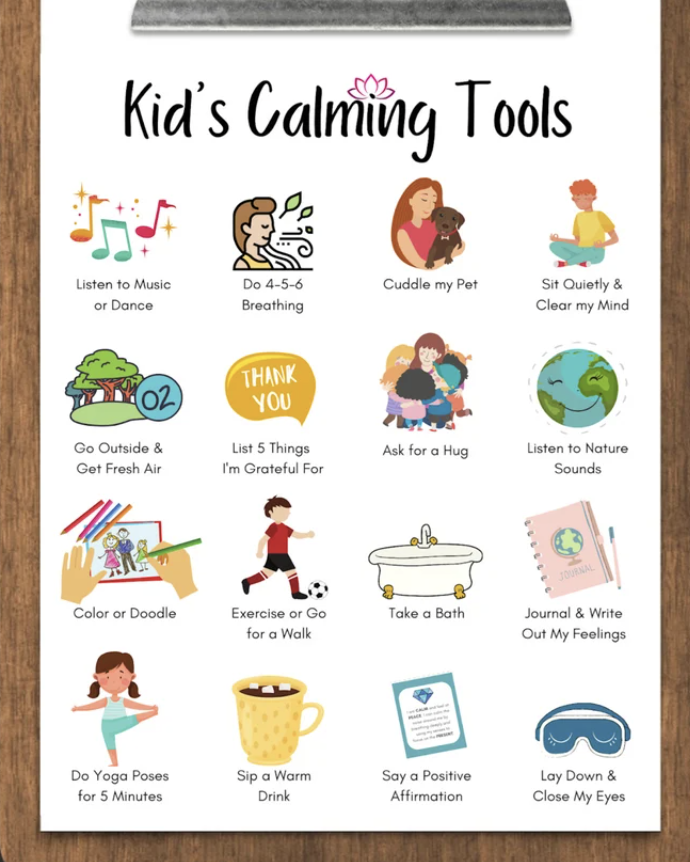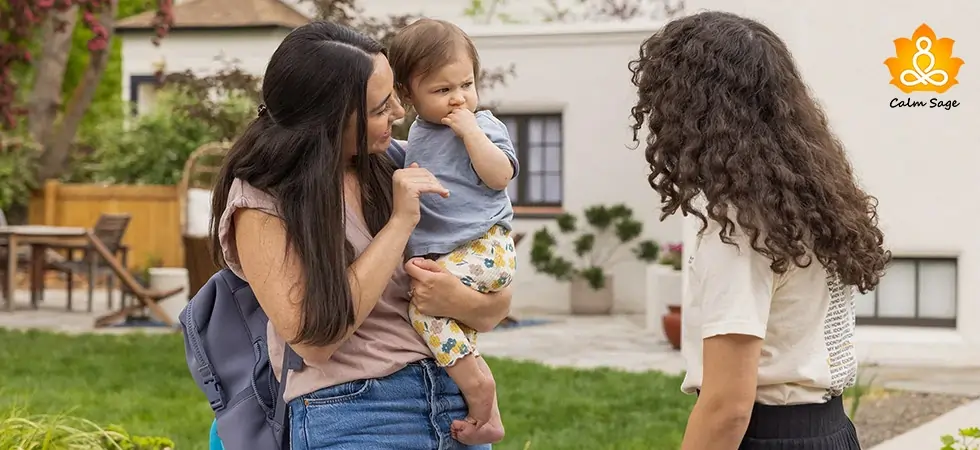Calm Your Tiny Tornados With These 30+ Calm Down Techniques (For Children)

Being a parent could be like riding a rollercoaster, with emotions taking the front seat. Every parent must have faced the challenge of calming their child when their little one is either upset, anxious, or distressed. It might not be easy to calm a distressed child as children don’t know why they are feeling this way in the first place, so how can they know when or even how to calm down? It’s the parent’s responsibility to find ways to calm their tiny tornados.
The key to parenting is to understand how to help your little one regulate their emotions. Even adults, at times, flounder when it comes to regulating their emotions, how can a child, who doesn’t even understand the meaning of emotional regulation do so?
Well, that’s what we’re here for, right? Today, we’re taking the psychological perspective behind why kids might need to calm down and 30+ calm-down techniques that you can try with your kids when they need a calming down. These simple yet effective calm-down techniques can help you in your parenting, turning tantrums into teachable moments!
So, are you ready to add emotional intelligence to your child’s development? Keep reading!
Also Read: 51 Keep Calm Quotes To Help Your Mind Stay Calm
When Does Your Child Need Calming Down?
Children, especially the toddlers in your life, can easily become overwhelmed and overstimulated by sensory overload. It could be a noisy environment, too bright lights, or crowds that can overwhelm your little one and trigger emotional distress. Moreover, as a child grows up, they are filled with a need to do everything on their own. But, a child’s a child; they might lack the skills to express themselves as they want to; causing frustration and meltdowns.
Let’s be honest; when you’re overtired, don’t you feel cranky? This can happen with a child as well. Just like their parents, a child can become irritable and can throw emotional tantrums when they are fatigued or if their routine is disrupted.
Unmanaged fatigue can also turn into anxiety in many children. Apart from that, new environments, unfamiliar people, and separation from their parents can trigger anxiety in children, after which they might need to calm down.
Children don’t know or rather, don’t understand emotions well. After all, they are still learning how to exist in this world, right? So, when they are faced with big emotions like anger, sadness, and even fear, they don’t know what to do with them. Here’s when a parent needs to step up and help the child cope with whatever is troubling them and whatever emotion it is that they can’t grasp.
Now, let’s take a look at the 30+ calm-down techniques for children you can do with your kid at home.
33 Calm-Down Techniques For Children
1. Balloon Breaths
One calm-down technique to try with children is the balloon breathing technique. In this, encourage your child to inhale deeply, imagining they’re blowing into a balloon. Exhale slowly as they release the air in the imaginary balloon.
2. Bubble Breaths
In this calm-down technique, your child can blow bubbles, and you can encourage them to take deep breaths while they watch the bubbles float away. This can also become somewhat of a mindfulness activity, as it encourages the child to be in the present.
3. Flower Breaths
Another breathing technique that you can try with your child is the flower breathing technique. In this calm-down technique, you can help your child inhale slowly, imagining smelling a flower, and exhale slowly as if they’re blowing the petals away in the wind.
4. Bunny Breaths
This calm-down technique for children can be fun, especially if your tiny one is a toddler. In this, you can demonstrate mimicking a bunny sniffing by taking short and fast breaths. Slowly, you can transition to longer and deliberate breaths as if calming down. Younger children might find this exercise fun!
5. Mindful Coloring
This calm-down technique for children involves coloring but mindfully. Here, you can give your child coloring sheets and encourage them to focus more on the colors, textures, sensations, and strokes they are working on, rather than the mere act of coloring. This activity can help them stay in the present while they are calming down.
6. Sensory Jars
Creating sensory jars is another interesting activity you can try with your kid when they need a calming down. In this, you can create sensory jars by mixing glitter with water and shaking them. Your child can watch the glitter settle in the jar as a mindfulness activity as it settles.
7. Nature Outing
Another calm-down technique for children can be a nature outing. Here, you can encourage your child to take a stroll around the garden or through a park. Ask them to pay attention to the sounds, smells, and feel of nature around them. This is a good teaching moment and a mindfulness activity at the same time!
8. Yoga
Yoga can also help your child calm down when they are distressed. You can engage your child in some kid-friendly yoga poses to promote relaxation and even body awareness as they come down from the high of their emotions.
9. Mindful Eating
Mindful eating doesn’t mean paying attention to what your child is eating, but how they are eating. Encourage your child to eat well and pay attention to the taste, texture, and the act of chewing to calm them down.
10. Guided Imagery
Imagination can be a great way to calm down your child as well. Here, all you need to do is tell a calming story to your child and let your child’s wild imagination do its thing and guide them to a peaceful or rather; to their happy place.
11. Body Scan
Another calm-down technique for children includes body scanning. You can help your child relax by guiding them to focus on each part of their body, starting with their toes and going to the head. Ask them to pay attention to the sensations in their body — from the tips of their toes to their head.
12. Dancing to the Beats
Now, this could be a fun activity to try with your kids when it’s time to calm them down. Put on your kids’ favorite beats and let them dance their stress, emotions, and tension away. This could be a movement-based activity to help them express the emotions they can’t talk about yet.
13. Stretching
Another movement-based calm-down technique is stretching. Here, you can encourage your kid to perform some simple stretches to release the physical tension they might be feeling. Once that’s done, your young one may find it easier to talk about what’s bothering them.
14. Yelling into the Pillow
Allow your child to express their feelings by yelling into the pillow. This activity offers a safe space for your child to express their frustrations and feel lighter, emotionally. Instead of letting your child stew in their negative emotions, yelling into the pillow could be more effective and cathartic.
15. Sensory Play
Another sensory-based activity to calm your child down is engaging in sensory play with them. This could involve play dough, sand, and water for tactile stimulation and expression. It could help your child feel soothed and calm.
16. Drama Time
You can also encourage your child to engage in imaginative play or role-playing games to express their feelings and emotions. This could help them feel less burdened and more relaxed.
17. Rip a Paper
Ripping paper can also be a therapeutic release. Here, you can hand your child a piece of paper and ask them to rip it up as a physical outlet for pent-up emotions and energy that doesn’t have an outlet.
18. Popping Bubble Wraps
Another calm-down technique that you can try with your child is popping bubble wrap. You can place bubble wrap on the floor and ask your child to stomp on it to pop the bubbles and release the energy that’s built up in them and haven’t found a relief.
19. Mimicking Animal Sounds
Another calm-down technique to try with children is animal imitation. You can mimic animal sounds and movements to make physical activity fun, expressive, and soothing for your child.
20. Hug it Out
Connection when calming down your child is also important, and you can do this by asking your child to hug it out. Offer a comforting hug to your child to offer them a sense of safety where they feel comfortable enough to talk about what’s bothering them.
21. Creating a Journal
You can also encourage your child to create a journal where they can draw or write about their feelings in ways, they find comfortable. This can also help your child feel more comfortable with their expression.
22. Puppet Play
There are many ways to calm your child down when they are overwhelmed, and one way is puppet play. This activity uses puppets to act out and discuss emotions in ways that help your child associate feelings easily.
23. Talk it Out
The simplest way that we find, as adults, is to talk about our feelings when it’s about soothing our worries. For children, it can be the same too. For that, you need to create a safe space for open communication with your child where they can freely talk about their feelings and concerns.
24. Mirror Emotions
Another calm-down technique for children is to play with mirror emotions. Here, you can make faces in front of a mirror, matching facial expressions to different emotions. This can help your child learn more about emotions as well, aiding in their mental development.
25. Painting Stones
If you want your child to calm down and learn about emotions, then one of the best ways is through painting different facial expressions on stones. This could be used as a stepping stone, pun intended, to teach children about different emotions.
26. Storytelling
You can also craft stories for your children and create innovative characters to teach your children how to overcome challenges and manage their emotions. Children learn better when they are exposed to stories and tales of courage.
27. Charades With Feelings
Another interactive and fun way to calm your children is through playing charades. You can play charades using different emotions to express different feelings. This could make teaching emotional regulation to children fun.
28. Seeking Coziness
Sometimes, your child might need to be quiet and alone to cope with their overwhelming feelings. For this, you can create a designated space with soft pillows, blankets, and their comfort toys where they can feel safe and relaxed.
29. Playing Calming Music
Some children find comfort in music, so to calm them down, play some calming music to create a soothing environment for them. This could calm them down easily and soothe their anxieties too.
30. Try Aromatherapy
To calm your distressed child, you can introduce some soothing aromas and scents through aromatherapy. Scents like chamomile and lavender can be soothing for the mind. So, try this, the next time your child is distressed.
31. Play Nature Sounds
Just like calming music holds its charm, nature sounds do too. You can use apps to play soothing natural sounds such as bustling brook, campfire, or birds chirping to promote a sense of peace and calm in your child.
32. Comfort Objects
We all have that one thing we look for when we need comfort. This is true for children too. To calm down your child, allow them to have a comforting object such as a stuffed animal or a blanket. It can make them feel calm and give them an anchor to hold them in the present moment.
33. Gratitude Sharing
Lastly, to calm your child, help them list things they are thankful for. Expressing gratitude for positive moments and things can help them create a positive mindset and keep the negative and worries away.

Wrapping Up…
Parenting is one of the most challenging jobs in the world, but it’s also an incredibly rewarding one. A journey of emotions, joy, growth, and connection is parenting. By understanding the triggers that cause your child to have an emotional meltdown, you can learn the best ways to calm them down. If you’re looking for calm-down techniques for children, then I hope these 30+ techniques will find you well.
Try these calming techniques for your child, the next time they are frustrated, overwhelmed, or distressed. Help them learn how to cope with their emotions in the best way possible.
If you found this article helpful, then let me know your thoughts in the comments below.
Happy Parenting!




















